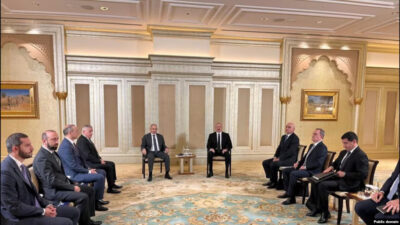By Edmond Y. Azadian
Migration has been the destiny of the Armenians. We have a tragic history of forced migration. Of course, the most spectacular migration which would end all subsequent migration was in the aftermath of the 1915 Genocide, which uprooted the bulk of the Ottoman Empire’s Armenian population from its historic homeland and scattered them around the world. That experience haunts every Armenian and has transcended from generation to generation, so much so that every time we see refugees behind barbed wire, every time a boat full of refugees sinks in the open sea, their plight touches a very sensitive chord deep within us.
The current flood of Syrian refugees inundating the Middle East, Europe and even North America is the result of a manmade humanitarian tragedy which certainly could have been averted and today it calls for urgent attention and action.
Admitting or denying refugees have outgrown its humanitarian scope to become a political, social, economic and psychological problem. Ancient fears and suspicions have been rekindled and they find their expression through political actions and reactions.
Fifty percent of Syria’s population has become refugees through the brutal civil war, overflowing into neighboring countries; individual countries, the EU and the UN have all been mobilized to address this vital issue of global magnitude.
Very similar to the times of the Armenian Genocide and the Jewish Holocaust, the powers that be could intervene and stop the carnage, but they did not. If we look at history, in Germany’s case, it even colluded with the Ottoman government. Later on, it set up humanitarian programs to win the gratitude of the victims and survivors. Today some of the countries posing as benefactors are the main cynical instigators of the tragedy. This case was starkly exposed at a heart-wrenching event in Paris, when Eric Ouzounian, the father of Lola Ouzounian, one of the victims of November 13’s attack on the Bataclan music venue, refused to take part in a memorial service dedicated to the memory of the victims and blamed the French government for the attacks in an article published by Huffington Post. In particular, he wrote: “France conducted a disastrous policy in the Near East for many years. Nicolas Sarkozy violated the UN Security Council resolutions banning all kinds of interventions by land in other countries, sent troops to Libya to topple Qaddafi, and joined the coalition against the head of Syria Bashar al-Assad, when these countries were not France’s enemies. … Recent presidents have acted with inconceivable frivolity, led by shortsighted vision. But this isn’t the only facet of the political world’s responsibility.”







